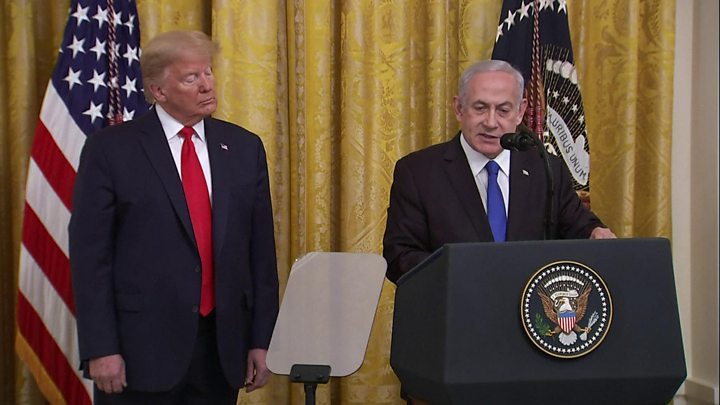Asia Times
ELLEN LAIPSON

The initial reactions to US President Donald Trump’s launch of “Peace to Prosperity: A Vision to Improve the Lives of the Palestinian and Israeli People” could have been predicted. Conservative Israelis and like-minded American Jews, American evangelicals and Trump’s base all celebrated this validation of the Trump-Netanyahu view of the region’s future, with Israeli security interests paramount. Palestinians complained bitterly that they were not part of the process, and America’s NATO allies and Arab partners were mostly silent or struggled to find words that would not invoke Trump’s wrath or undermine long-held positions on Arab-Israeli peace.
The peace camp, already despondent from years of inaction, expressed their dismay in varying degrees. Headlines in the mainstream Israeli newspaper Ha’aretz called the plan “ludicrous, dangerous and one-sided.” Liberal pro-Israeli and pro-peace American groups fretted about a plan that would more likely lead to conflict than peace, and diplomats who spent their entire careers on this issue despaired at the loss of credibility for carefully calibrated American and international efforts to find a just, equitable solution.
The Trump approach front-loads Israeli security interests by allowing Israeli settlements and the Jordan Valley terrain to be annexed to Israel, which Prime Minister Benjamin Netanyahu is expected to act on immediately, upending the international legal basis for peace negotiations. A so-called Palestinian state, to be recognized only if the Palestinians can meet onerous preconditions of modern, liberal governance, would consist of segments of territory linked by bridges and tunnels, to avoid contact with any of the Israeli enclaves in territory long presumed to be on the table for a territorial resolution with an independent Palestinian state.
The British have a special sensitivity on the topic. After all, it was under the British mandate that the Balfour Declaration was issued in 1917, along with contradictory promises to Arab leaders. It was the abrupt British departure from Palestine in 1947 that led to the United Nations’ endorsement of a two-state solution, and when the Arabs objected, the first of the Arab-Israeli wars broke out.
So it was painful to hear British current and former officials trying to find something to say, without completely repudiating decades of UK and UN diplomacy: Foreign Minister Dominic Raab said, “We encourage them [Israelis and Palestinians] to give these plans genuine and fair consideration, and explore whether they might prove a first step on the road back to negotiations.” Former prime minister and UN peace negotiator Tony Blair tried to assure the Palestinians that they would be taken seriously by the Trump administration if they engaged on the plan.
As much as the administration is touting the plan as a fresh, more sustainable approach to peace, scholar Martin Kramer, an Israeli-American, sees it in a pattern of initiatives since 1947 that have offered more to Israel, and have consistently been rejected by the Arab side. But he explains that this plan is different in one key way: it does not enjoy legitimacy by the international community, whether formally through the UN process or more recent ad hoc peace teams.
Others point to the asymmetry between early political success for Israel, with delayed political gratification for the Palestinians, and only if they meet certain criteria. The plan is premised on the Palestinians accepting its vision for greater economic satisfaction, through investments, job creation and improved regional channels for trade and development, in lieu of any fundamental endorsement of Palestinian rights to an independent, sovereign state. But the US$50 billion goal is wildly unrealistic, and presidential son-in-law Jared Kushner has spent many months cajoling business leaders and wealthy Gulf Arabs to pledge financial support, with no evidence of any concrete commitments.
In fact, the plan was premised on an “outside-in” logic, that more important Arab states would associate themselves with the plan, and persuade the Palestinians that they should accept this reduced offering, compared to the “just, equitable” formula of the past. But the breakdown in solidarity or sympathy between wealthy Arab states and the Palestinian community is deep, and there is little to suggest that major Arab states can create any momentum for the plan, or even muster any enthusiasm for Palestinian aspirations. Of course, Palestinian political dysfunction and the radicalization of politics through the emergence of Hamas as a counterweight to the old Palestine Liberation Organization leadership are equally to blame for the absence of Arab unity.
The 181-page report contains often clumsy, long lists of soundbites about the region’s woes. Kushner and his team are showing us they listened carefully to diverse viewpoints. But their pride in abandoning the old playbook for a slick package of economic promises to the Palestinians in lieu of a fresh diplomatic initiative is misplaced, and many are braced for a new wave of violence.




